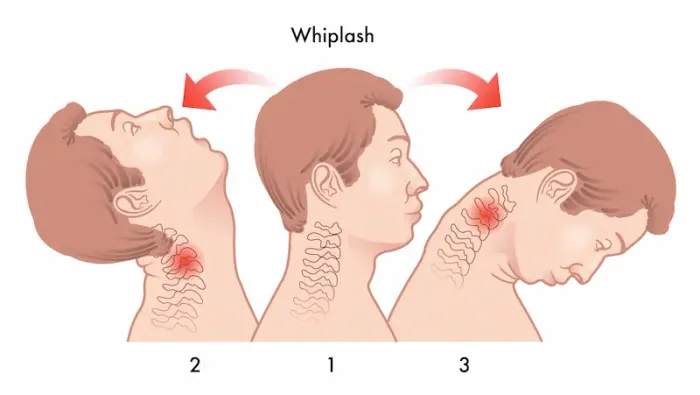Whiplash Symptoms, Causes and Treatment Options
Know about the whiplash, what it is, causes, symptoms, treatment options and management. Learn about the prevention of whiplash and more.

Written by Dr. Shaik Abdul Kalam
Reviewed by Dr. Vasanthasree Nair MBBS
Last updated on 13th Jan, 2026

Introduction
Whiplash is a common neck injury that occurs when the head is suddenly jerked backwards and then forward, straining the neck muscles and ligaments. This motion resembles the cracking of a whip, hence the name. While whiplash is often associated with car accidents, it can also result from sports injuries, physical abuse, or other sudden impacts.
If you or someone you know has experienced whiplash, understanding its symptoms, causes, and treatment options can help in managing the condition effectively.
Symptoms of Whiplash
Whiplash symptoms may not appear immediately after an injury sometimes, they develop over hours or even days.
Common signs include:
• Neck pain and stiffness – The most noticeable symptom, often worsening with movement.
• Headaches – Typically starting at the base of the skull and spreading forward.
• Shoulder and upper back pain – Due to muscle strain.
• Dizziness or fatigue – Some people feel lightheaded or unusually tired.
• Blurred vision or ringing in the ears (tinnitus) – Less common but possible.
• Difficulty concentrating or memory issues – Some experience mild cognitive symptoms.
• Sleep disturbances or irritability – Pain and discomfort can affect mood and rest.
If symptoms persist or worsen, it’s important to seek medical advice to rule out more serious injuries.
Consult General Practitioner for Personalised Advice
Causes of Whiplash
Whiplash occurs when the neck is forced into a rapid back-and-forth motion.
Common causes include:
• Car accidents (especially rear-end collisions) – The sudden impact jerks the head violently.
• Sports injuries – Contact sports like football or activities with falls (e.g., skiing, gymnastics).
• Physical abuse or assault – Being shaken or struck can cause whiplash.
• Amusement park rides or roller coasters – Sudden stops or jerks may strain the neck.
• Falls or other sudden trauma – Tripping or slipping can also lead to whiplash.
Even low-speed accidents can cause whiplash, so it’s important not to ignore symptoms just because the impact seemed minor.
How Whiplash Affects Your Health?
While many people recover from whiplash within a few weeks, some experience long-term complications, including:
• Chronic neck pain – If not treated properly, pain may persist for months or years.
• Reduced range of motion – Stiffness can make turning the head difficult.
• Persistent headaches or dizziness – Some people develop ongoing discomfort.
• Emotional distress – Chronic pain can lead to anxiety, depression, or sleep problems.
Early treatment and proper care can help prevent long-term issues.
Treatment Options for Whiplash
Treatment depends on the severity of the injury, but common approaches include:
1. Rest and Activity Modification
• Avoid strenuous activities that worsen pain.
• Gentle movement (like slow neck rotations) can prevent stiffness.
2. Pain Relief
• Over-the-counter painkillers (e.g., ibuprofen, acetaminophen) help reduce pain and inflammation.
• Prescription medications (for severe pain or muscle spasms).
3. Physical Therapy
• Stretching and strengthening exercises improve flexibility and support recovery.
• A therapist may recommend heat/cold therapy or massage.
4. Neck Support (Collar Use)
• Soft cervical collars may be used for short-term support but should not be worn too long, as prolonged immobilisation can weaken muscles.
5. Alternative Therapies
• Chiropractic care – Gentle adjustments may help realign the spine.
• Acupuncture – Some find relief from pain through this method.
6. Lifestyle Adjustments
• Good posture – Avoid slouching to reduce strain.
• Ergonomic workspace setup – Adjust computer screens and chairs to prevent neck strain.
• Stress management – Relaxation techniques (yoga, deep breathing) can ease muscle tension.
When to See a Doctor
Most cases of whiplash improve with self-care, but seek medical attention if:
• Pain spreads to arms or shoulders.
• Numbness or tingling occurs in limbs.
• Symptoms worsen after a few days.
• You experience severe headaches, dizziness, or memory problems.
If you suspect whiplash after an accident or injury, consulting a doctor ensures proper diagnosis and treatment.
Preventing Whiplash
While not all accidents can be avoided, some precautions can reduce risk:
• Adjust car headrests properly – They should be at head level to limit backwards motion.
• Wear seatbelts correctly – Prevents excessive movement during collisions.
• Strengthen neck muscles – Gentle exercises can improve resilience.
• Use proper sports gear – Helmets and protective equipment help minimise injury risks.
Final Thoughts
Whiplash can be painful and disruptive, but with proper care, most people recover fully. Listen to your body, follow medical advice, and make small lifestyle adjustments to support healing. If symptoms persist, professional help is just a call or click away.
Consult General Practitioner for Personalised Advice
Consult General Practitioner for Personalised Advice

Dr. Anand Ravi
General Physician
2 Years • MBBS
Bengaluru
PRESTIGE SHANTHINIKETAN - SOCIETY CLINIC, Bengaluru

Dr. Vivek D
General Physician
4 Years • MBBS
Bengaluru
PRESTIGE SHANTHINIKETAN - SOCIETY CLINIC, Bengaluru

Dr Syed Mateen Pasha
General Physician
2 Years • MBBS
Bengaluru
PRESTIGE SHANTHINIKETAN - SOCIETY CLINIC, Bengaluru

Dr. Syed Ismail Ali
General Practitioner
7 Years • MBBS
Hyderabad
Apollo 24|7 Clinic, Hyderabad

Dr. Debajyoti Goswami
Obstetrician and Gynaecologist
10 Years • MBBS,D.G.O(DNB),Adv. Infertility Tech.(AIIMS),Fellowship in Diabetes(U.K),Comprehensive Abortion Care(Govt. Of W.B), Certificate in Clinical Embryology(AIIMS, BHUBANESWAR)
Bankura
D.G Clinic, Bankura
(25+ Patients)
Consult General Practitioner for Personalised Advice

Dr. Anand Ravi
General Physician
2 Years • MBBS
Bengaluru
PRESTIGE SHANTHINIKETAN - SOCIETY CLINIC, Bengaluru

Dr. Vivek D
General Physician
4 Years • MBBS
Bengaluru
PRESTIGE SHANTHINIKETAN - SOCIETY CLINIC, Bengaluru

Dr Syed Mateen Pasha
General Physician
2 Years • MBBS
Bengaluru
PRESTIGE SHANTHINIKETAN - SOCIETY CLINIC, Bengaluru

Dr. Syed Ismail Ali
General Practitioner
7 Years • MBBS
Hyderabad
Apollo 24|7 Clinic, Hyderabad

Dr. Debajyoti Goswami
Obstetrician and Gynaecologist
10 Years • MBBS,D.G.O(DNB),Adv. Infertility Tech.(AIIMS),Fellowship in Diabetes(U.K),Comprehensive Abortion Care(Govt. Of W.B), Certificate in Clinical Embryology(AIIMS, BHUBANESWAR)
Bankura
D.G Clinic, Bankura
(25+ Patients)